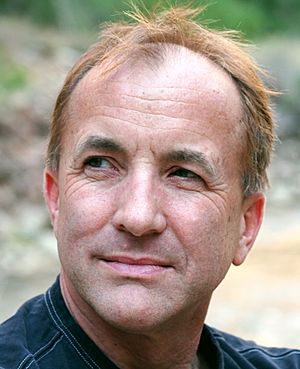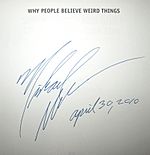Michael Shermer facts for kids
Quick facts for kids
Michael Shermer
|
|
|---|---|

Shermer in 2007
|
|
| Born | September 8, 1954 Los Angeles, California, U.S.
|
| Education | Pepperdine University (BA) California State University, Fullerton (MA) Claremont Graduate University (PhD) |
| Occupation | writer, historian of science, editor |
| Title | Editor-in-chief of Skeptic, adjunct professor at Chapman University |
| Signature | |
 |
|
Michael Brant Shermer (born September 8, 1954) is an American science writer and historian of science. He is best known as the founder of The Skeptics Society and the editor of its magazine, Skeptic. This magazine looks closely at claims that seem strange or unproven, like stories about ghosts or aliens.
A person who is a skeptic asks for evidence before believing something. Shermer uses science to investigate claims about pseudoscience (ideas that seem scientific but are not) and the supernatural. He has written many books and often takes part in debates about science and religion.
From 1999, Shermer co-hosted a TV show called Exploring the Unknown. For almost 18 years, from 2001 to 2019, he also wrote a monthly column for Scientific American magazine.
Shermer did not grow up in a religious family, but he became a Christian as a teenager. Later, during his university studies, he began to question his beliefs. A serious accident involving a close friend was a major reason he stopped believing in God. Today, he calls himself a skeptic and an agnostic (someone who thinks it's impossible to know if God exists).
Contents
Early Life and Schooling
Michael Brant Shermer was born on September 8, 1954, in Los Angeles, California. He grew up mostly in the La Cañada Flintridge area of Southern California. His parents divorced when he was young.
Although his family wasn't very religious, a friend encouraged him to explore Christianity when he was in high school. For seven years, Shermer was a devoted Christian and even went door-to-door to share his faith. He enjoyed the social parts of religion, especially discussing different ideas.
In 1972, Shermer started at Pepperdine University, planning to study Christian theology. However, he switched his major to psychology. He earned his bachelor's degree in psychology in 1976.
He then went to California State University, Fullerton to study experimental psychology. His talks with professors and his studies in science made him doubt his religious beliefs. He felt that some religious teachings were intolerant and that many believers didn't practice what they preached. He also realized that people's beliefs often depended on where and when they were born.
A key moment for him was when his college girlfriend was in a car accident that left her paralyzed. When prayers for her recovery went unanswered, he began to think that God probably did not exist. He earned his master's degree in psychology in 1978.
Career
Professional Cycling
After getting his master's degree, Shermer started working for a bicycle magazine. This led him to take up bicycle racing. He soon became a professional and competed for ten years in ultramarathon road races, which are incredibly long-distance events.
Shermer is a founding member of the Ultra Cycling Hall of Fame. He helped create the Race Across America (RAAM), a famous 3,000-mile nonstop bike race across the United States. He competed in it five times.
During his cycling career, he helped develop safer gear for cyclists. He worked with Bell Helmets to design helmets with a special foam that could absorb big impacts. He also helped a company called Spenco Medical create special gels for bicycle gloves and seats. These gels helped prevent injuries that many cyclists suffered from.
A medical problem was even named after him: "Shermer's Neck." It's a condition where the neck muscles become extremely weak during long-distance races. Shermer experienced this himself during the 1983 Race Across America.
His time as a cyclist also turned him into a skeptic. In 1983, after following advice from a "nutritionist" with fake qualifications, he realized that many things he had tried to improve his performance, like special diets and therapies, didn't actually work. He decided to rely on scientific evidence instead.
Teaching and the Skeptics Society
While he was a cyclist, Shermer taught psychology at a community college. He wanted to teach at a four-year university, so he decided to get his PhD. He switched his focus from psychology to the history of science and earned his doctorate from Claremont Graduate University in 1991.
He later taught at Occidental College and Chapman University, where he created a course on critical thinking called "Skepticism 101."
In 1991, Shermer co-founded The Skeptics Society. It is a non-profit group that encourages people to think critically and use science to examine unusual claims. The society publishes Skeptic magazine and hosts a popular lecture series. Today, it has over 50,000 members.
Books and Writing
Michael Shermer has written many books that explore why people believe in things without good evidence, such as UFOs or Bigfoot.
- Why People Believe Weird Things (1997): In this book, Shermer introduces his idea of "patternicity." This is the brain's tendency to find patterns, even in random information. For example, seeing a face in the clouds is a form of patternicity. He explains that believing something false is a "Type 1 Error," while not believing something true is a "Type 2 Error."
- Denying History (2002): Co-written with Alex Grobman, this book looks at the Holocaust denial movement. It explains how some people try to deny that this historical event happened and shows why their arguments are wrong.
- Why Darwin Matters (2006): This book defends the theory of evolution and argues against intelligent design (the idea that life is too complex to have evolved without a creator). Shermer explains that science and religion don't have to be in conflict.
- The Believing Brain (2011): Shermer explains how our brains create beliefs first and then find reasons to support them. He argues that we build our beliefs based on our emotions and experiences, not just logic.
- The Moral Arc (2015): In this book, Shermer suggests that science and reason have made the world a better, more just, and freer place over time.
Media and Public Talks
Shermer has appeared on many television shows to discuss skepticism. In 1994, he was on the Donahue show to challenge claims made by Holocaust deniers. He also appeared on The Oprah Winfrey Show to question a psychic's abilities.
He has given several popular TED talks, including "Why people believe strange things" and "The pattern behind self-deception." He has also debated many people on topics like science and God, including a well-known debate with author Deepak Chopra.
In 2012, he spoke at the Reason Rally in Washington, D.C., an event for thousands of non-religious people.
Personal Life
Shermer was previously married to Kim Ziel, and they have a daughter. On June 25, 2014, he married Jennifer Graf, who is from Cologne, Germany.
Political Views
Shermer calls himself a libertarian, which means he believes in personal freedom and limited government.
For a long time, Shermer was skeptical about global warming. However, as more scientific evidence became available, he changed his mind. In 2006, he wrote that the evidence for global warming was too strong to ignore.
He has also changed his views on gun control. He owned a gun for protection for many years and supports the right to own guns. But after looking at the data on gun violence, he came to believe that some sensible gun laws are needed to improve safety.
Awards and Honors
- Fellow of the Linnean Society of London (2001)
- Distinguished Alumni Award from California State University, Fullerton (2002)
- Honorary Doctorate from Whittier College (2008)
- Award from the Independent Investigations Group (2010)
See also
 In Spanish: Michael Shermer para niños
In Spanish: Michael Shermer para niños
 | William L. Dawson |
 | W. E. B. Du Bois |
 | Harry Belafonte |


